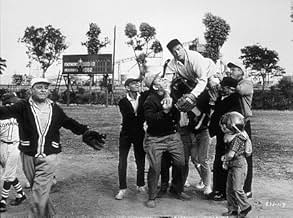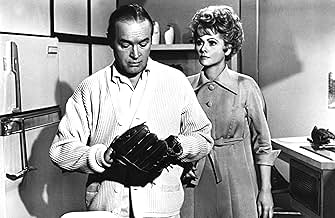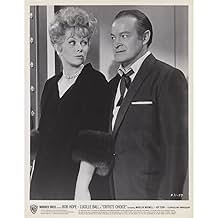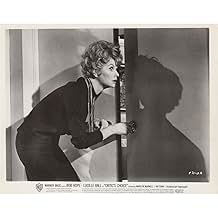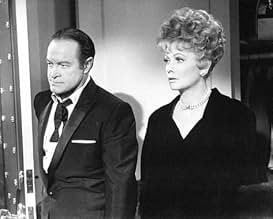IMDb RATING
5.7/10
1.2K
YOUR RATING
Parker Ballantine is a New York theater critic and his wife writes a play that may or may not be very good. Now Parker must either get out of reviewing the play or cause the breakup of his m... Read allParker Ballantine is a New York theater critic and his wife writes a play that may or may not be very good. Now Parker must either get out of reviewing the play or cause the breakup of his marriage.Parker Ballantine is a New York theater critic and his wife writes a play that may or may not be very good. Now Parker must either get out of reviewing the play or cause the breakup of his marriage.
Rickey Kelman
- John Ballantine
- (as Ricky Kelman)
Joseph Gallison
- Philip 'Phil' Yardley
- (as Evan McCord)
- Director
- Writers
- All cast & crew
- Production, box office & more at IMDbPro
Storyline
Did you know
- TriviaLast of four feature films that Bob Hope and Lucille Ball made together. The other three pictures were Fancy Pants (1950), Sorrowful Jones (1949), and The Facts of Life (1960).
- GoofsThe movie takes place in New York, but during the softball game, the famed Los Angeles Gas Works tank is clearly visible in the background.
- Quotes
John Ballantine: For the record, Sisters Three was written by Angela Ballantine, directed by Dion Kapakos, and produced by mistake.
- Crazy creditsEnding: "The absolute End"
- ConnectionsReferenced in What's My Line?: Bob Hope and Lucille Ball (1963)
Featured review
When you watch a film that starred two legends of comedy (Lucille Ball and Bob Hope) you expect to find a very funny movie. And, yes, "Critic's Choice" has some amusing parts to it. As a comedy, it's more "Bob Hope" style than "Lucille Ball" style. The humour is more subtle and ironic (more like Hope) than the kind of slapstick physical comedy that Ball was known for - although it does include some physical comedy, surprisingly given to Hope in the last half hour or so. But to call this movie a "comedy" I think is to miss the point. I saw it as more of a drama, even more a psychological study of Hope's character. He played Parker Ballantine, a fierce Broadway critic for a New York newspaper, while Ball plays his wife Angie, who gets it into her head to write a play about her early life with her mother and three sisters.
If I were to rate this as a comedy, I'd probably say that it fell flat - but I was actually quite taken with the story and the character of Parker. He was an unpleasant character. Yes, Hope played him with some comedy - but he wasn't a nice man. Once Angie decided to write her play (very early in the movie) Parker wouldn't let his critic's voice go. He discouraged her, he belittled her, he made fun of her - and most of it, while couched as a comedy, was actually rather mean and not funny. When the movie opened, Parker was writing a scathing review of a play that starred his ex-wife (who was played by Marilyn Maxwell.) That goes almost immediately into his acerbic attitude toward Angie's play. The point gets made in the movie that maybe Parker has a problem - he disses everything that the women who are close to him try to do, almost as if he's trying to sabotage them and their careers; as if he doesn't want a "successful" woman in his life. And, although there's an attempt to redeem him slightly at the end, Parker's most obnoxious scenes come late in the movie at the theatre, the night Angie's play opens in New York. Having withdrawn from reviewing the play, he shows up anyway - drunk and, frankly, obnoxious (I'm not sure why he wouldn't have been kicked out of the theatre, or even why he was allowed in in the first place) - tries to kick his paper's reviewer out and when he can't do that goes up to the balcony and causes quite a scene (this is where Hope's physical comedy comes in.) He then proceeds to write a review of the play anyway and his review is blistering, as he writes that the play "was written by Angela Ballantine, directed by Dion Kapakos, and produced by mistake." (I must admit that I wondered why his paper would allow a drunken reviewer - even a big name one - to write a review of a play written by his own wife to which someone else had been assigned as the reviewer, but maybe that's thinking too much about this.)
This was not what I was expecting. I was expecting a light comedy - instead I got more of a drama about a couple with some really serious issues in their marriage. And while I wouldn't rate it that highly as a comedy, I thought that if you look at it as a marital drama it's actually pretty good. For me, the most powerful scene in the movie didn't even involve Ball - it was the very dramatic and even acerbic confrontation between Parker and his son John (played by Ricky Kelman) - who seems to have irritated a few reviewers, but who I thought was actually pretty good, playing a kid who had obviously been raised in a somewhat strange environment. The scene was set at home on opening night, before Parker's drinking binge. That confrontation aside, John's relationship with his mother (Maxwell) was especially weird - she seems to have been largely uninterested in him, and he calls her not "Mom" but "Ivy."
There's a decent supporting cast - most of whose names (Rip Torn, Jim Backus, Richard Deacon and even Soupy Sales) add to the expectation that you're going to be watching a funny movie. But I would suggest not watching this to get a good laugh, even if that is your initial expectation. Watch it as more of a character study of Parker. It works much better that way. (7/10)
If I were to rate this as a comedy, I'd probably say that it fell flat - but I was actually quite taken with the story and the character of Parker. He was an unpleasant character. Yes, Hope played him with some comedy - but he wasn't a nice man. Once Angie decided to write her play (very early in the movie) Parker wouldn't let his critic's voice go. He discouraged her, he belittled her, he made fun of her - and most of it, while couched as a comedy, was actually rather mean and not funny. When the movie opened, Parker was writing a scathing review of a play that starred his ex-wife (who was played by Marilyn Maxwell.) That goes almost immediately into his acerbic attitude toward Angie's play. The point gets made in the movie that maybe Parker has a problem - he disses everything that the women who are close to him try to do, almost as if he's trying to sabotage them and their careers; as if he doesn't want a "successful" woman in his life. And, although there's an attempt to redeem him slightly at the end, Parker's most obnoxious scenes come late in the movie at the theatre, the night Angie's play opens in New York. Having withdrawn from reviewing the play, he shows up anyway - drunk and, frankly, obnoxious (I'm not sure why he wouldn't have been kicked out of the theatre, or even why he was allowed in in the first place) - tries to kick his paper's reviewer out and when he can't do that goes up to the balcony and causes quite a scene (this is where Hope's physical comedy comes in.) He then proceeds to write a review of the play anyway and his review is blistering, as he writes that the play "was written by Angela Ballantine, directed by Dion Kapakos, and produced by mistake." (I must admit that I wondered why his paper would allow a drunken reviewer - even a big name one - to write a review of a play written by his own wife to which someone else had been assigned as the reviewer, but maybe that's thinking too much about this.)
This was not what I was expecting. I was expecting a light comedy - instead I got more of a drama about a couple with some really serious issues in their marriage. And while I wouldn't rate it that highly as a comedy, I thought that if you look at it as a marital drama it's actually pretty good. For me, the most powerful scene in the movie didn't even involve Ball - it was the very dramatic and even acerbic confrontation between Parker and his son John (played by Ricky Kelman) - who seems to have irritated a few reviewers, but who I thought was actually pretty good, playing a kid who had obviously been raised in a somewhat strange environment. The scene was set at home on opening night, before Parker's drinking binge. That confrontation aside, John's relationship with his mother (Maxwell) was especially weird - she seems to have been largely uninterested in him, and he calls her not "Mom" but "Ivy."
There's a decent supporting cast - most of whose names (Rip Torn, Jim Backus, Richard Deacon and even Soupy Sales) add to the expectation that you're going to be watching a funny movie. But I would suggest not watching this to get a good laugh, even if that is your initial expectation. Watch it as more of a character study of Parker. It works much better that way. (7/10)
- How long is Critic's Choice?Powered by Alexa
Details
- Release date
- Country of origin
- Language
- Also known as
- Tu das nicht, Angelika
- Filming locations
- William Mead Homes, 1300 Cardinal Street, Los Angeles, California, USA(Apartments/baseball field)
- Production company
- See more company credits at IMDbPro
- Runtime1 hour 40 minutes
- Aspect ratio
- 2.35 : 1
Contribute to this page
Suggest an edit or add missing content



